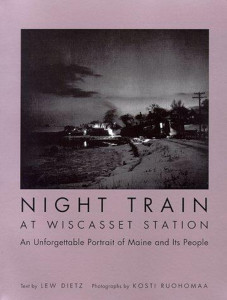
Winter is icummen in,
Lhude sing Goddamm.
Raineth drop and staineth slop,
And how the wind doth ramm!
These lines by Ezra Pound have inhabited my little world for about 40 years. He actually wrote them more than half a century before I ran across them on a blustery January day. And it turned out he stole the whole tune from a 700-year-old song about summer — “Sumer is icumen in, Lhude sing cuccu” (Summer’s here, the cuckoo’s singing loud).
What a sweet, raucous little poem to read on a bitter winter afternoon, when the world is made only of snow and words. This year, on the advice of a correspondent, my winter reading has been a book Lew Dietz wrote 40 years or so ago, “Night Train at Wiscasset Station,” which is a rumination on what Maine used to be like before the pivot out of the 1970s, when it was clear to him, me and everybody else who could think, that Maine was changing, possibly not for the better.
After most of a lifetime of frittering and digging around in English and some of its more abstruse contexts, and simultaneously devoting hundreds of life-hours to the complicated problem of winter in Maine and getting almost nowhere, hell if I did not come across a word in Dietz’s book that I had never seen or heard before: “brumal.” It means: of, relating to, or occurring in winter.
come across a word in Dietz’s book that I had never seen or heard before: “brumal.” It means: of, relating to, or occurring in winter.
Where was the word brumal when I needed it decades ago? It’s as if it was buried in a snowbank with the other stuff left in the yard and forgotten back in November or October — a baseball glove, a bike, a length of chain, a life jacket, some of which you don’t even remember owning. Then the snow melts and exposes it, and you say: That was there all winter? Where did it even come from?
Where did the word brumal come from? Well, it turns out to be directly from Latin, “brumalis,” a word derived from “bruma” (winter), which likely came from “brevimas” (brief), as in “brevimas dies” (the shortest day, i.e., the first day of winter).
Our word winter is straight out of Old English, a Germanic language that didn’t start absorbing Latin cognates until 1066 when the Old French-speaking Normans beat the Anglo-Saxons at the Battle of Hastings in southern England. That happened in October. Bruma never touched winter, which not only survived through Chaucer and whoever composed “Sumer is icumen in,” up through Shakespeare and into 21st century New England, but also goes back in etymological time to a cognate in eighth or ninth century Old Icelandic (“vetr”). Seven or eight centuries before that, the Gothic language had the word “wintros,” which likely derived from an earlier proto-Germanic word that was probably something like “wentruz.” And the linguists think wentruz probably came from a version of an original Indo-European morpheme from 5,000 or 6,000 years ago, “wed-“, which is the ancient precursor of our words wet and water.
“Raineth drop and staineth slop!”
In Dietz’s book, photos by Kosti Ruohomaa show bleak, snowy back roads and buried fields, chilly-looking Maine farmhouses and old geezers from the 1940s and ’50s with pipes sticking out of their mouths sitting around stoves and telling stories. Lobster boats in winter gales and seiners in hip boots pushing around sloughs of fish on cold-looking decks. I recognize all this — it was real. But I think that, while fishing and storytelling are still going on, what’s happening in those photos is mostly gone now.
Ruohomaa, a Finn whose ancestral winters are even darker than northern New England’s, sometime in the 1940s froze the Wiscasset train station in a moment of time. On a frigid evening, an electric light peeks feebly out of a rail car stopped near a snow-crusted tidal lip under a graying winter sky. This is what brumal Maine actually looked and felt like. Bleak, bone-chilling, and so deeply familiar of my childhood it’s almost like the voice of the beloved itself.
Winter goes glacier deep in Maine. In memory, snow buries everything. On some January afternoons, the only things breathing are words. A raucous poem about winter. A book bearing witness to a passing era. It’s cold so far back in time that even the Passamaquoddys, who were here for eons before English, Finns or even Vikings arrived, don’t exactly name it, but use a morpheme, “pun,” in agglutinative words that express whole sentences instead of isolating one bleak, inadequate sound to represent the whole multi-complicated season — “pecihpun”: winter has arrived; “puninaqot”: it looks wintry; “puniwi”: brumal.
Dietz’s chapter on the seasons opens: “Responding to a question from a Danish Arctic explorer a half century ago, the Eskimo shaman said: ‘We fear the cold and the things we do not understand.'”
When Dietz was saying “a half century ago,” the Eskimo, in turn, was no doubt echoing thoughts uttered by Inuit and Passamaquoddy ancestors who probably trekked the ice of the Bering land bridge 12,000 years before that.
It was strange in last weekend’s bewildering rainstorm to read Dietz’s 1970s ruminations on Maine’s morph from the cozy ferocity of winters in the 20th and 19th centuries toward whatever it is we have now.
Dana Wilde lives in Troy. You can contact him at [email protected]. Backyard Naturalist appears the second and fourth Thursdays each month.
Comments are no longer available on this story